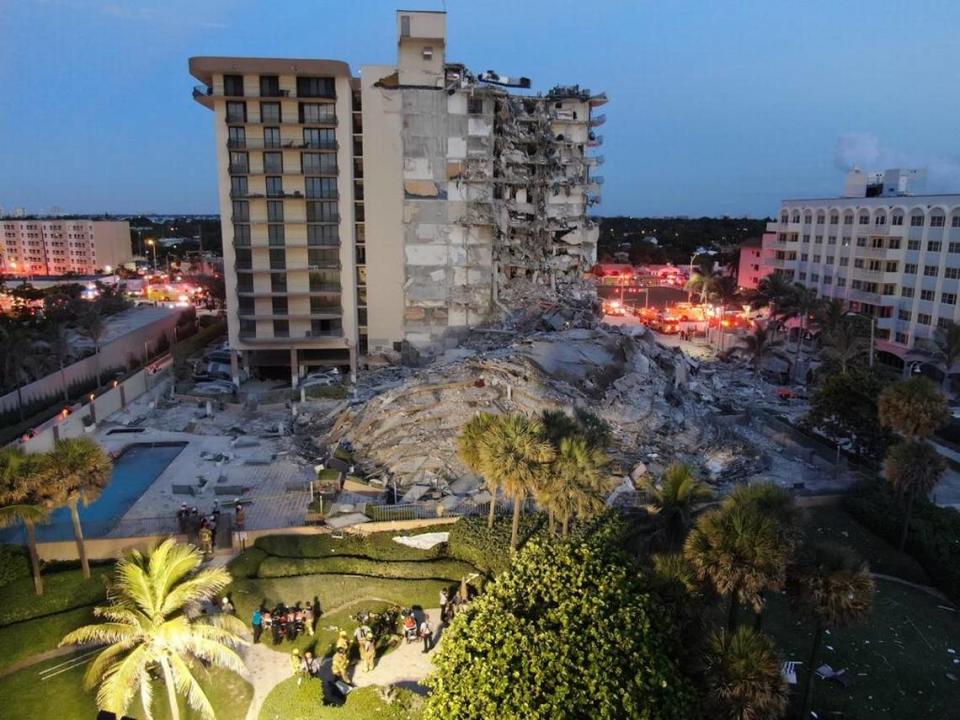‘The apartments were gone.’ Survivors recount harrowing escape from collapsed condo
Alfredo and Marian Lopez were sound asleep around 1:30 a.m. Thursday when they heard the first boom, like a crash of thunder from a Florida squall. Only louder.
“I woke up and thought we’re just having a bad thunderstorm,” Alfredo, 61, later told the Miami Herald. The noise jolted him from sleep in his sixth-floor apartment at the northwest corner of Champlain Towers South in Surfside.
So did Bruno Treptow, 62, who was sleeping in his unit exactly two floors above, in the same corner of the 40-year-old, 12-story condo tower.
“Did lightning just hit the building?” Treptow wondered. Then the lights went out.
The second boom shook the Lopezes’ bed. Their whole sixth-floor apartment rattled. Treptow’s floor moved beneath him. The chandelier in Sharon Schechter’s 11th-floor unit swayed.
What was left of the building trembled.
Marian Lopez thought an earthquake might’ve hit their home of 22 years. Alfredo thought maybe something had exploded at the hotel next door. The view from their bedroom window, which faces Collins Avenue in Surfside, was obscured by a thick cloud of dust.
Their adult son ran into their bedroom. “What the hell is happening?” he asked them, clearly in shock. Neither Marian nor Alfredo had an answer. No one did.
99 feared missing in rubble of collapsed condo in Surfside as search, vigil continue
A roof collapse?
Still recovering from his own shock, Treptow’s first thought was of the construction work that had been happening on the condominium’s roof as part of the building’s 40-year recertification. Had the heavy machinery caused the roof to collapse? He feared that whatever it was, it would kill him and his wife.
“I thought to myself, the roof is caving. I turned to my wife and she wakes up startled. And she says no it can’t be,” Treptow said. “So I hug her. I give her a hug and say, ‘Listen, this is it. We’re gonna die.’ ”
On the ninth floor, a caretaker for an elderly disabled woman was working her overnight shift when she felt the tremor. She called her husband, Santo Mejil, 50, who was asleep at their home near Miami International Airport. He jumped in the car and drove east. No car could go fast enough.
Alfredo turned on his phone’s flashlight while Marian grabbed her eyeglasses and looked for closed-toe shoes, unsure of what would be on the other side of the door. Some of the dust was starting to waft into the apartment. Flip-flops would have to do. So would pajamas. No time to change.
The Treptows, too, had gotten out of bed and begun to gather a few things. Bruno tried to peer out his front door, but what looked like a thick fog clouded everything. He could feel the wind blowing, carrying strips of debris through the air. Part of the roof must’ve given out, he figured. He went back inside to get dressed.
‘That complete side of the building was gone’
Just about 20 feet below, Alfredo opened the front door minutes later. The dust had dissipated, and the scene before him was horribly clear.
His home was about five feet away from calamity. Where the hallway with his neighbor’s doors should have been, there was nothing. Just billowing dust, sky and a dark beach. Half of a vertical community that stretched about 120 feet into the air had vanished.
“That complete side of the building was not there,” Marian said. “The apartments were gone.”
Dressed and ready to leave, Treptow stepped out of his unit. He faced the same surreal abyss. To one side, he saw only his neighbor’s doorframe. No door.
“Three families that I know well,” he later recounted, his voice cracking. He doesn’t expect that they’ll be found alive.
Barry Cohen, a former vice mayor in this small seaside town, and his wife, Ofi, have lived in their third-floor unit since 2018. When they opened their door, they saw more clearly what had happened. Almost half of the building’s units had collapsed in a heap of twisted metal and cracked concrete. Their sleeping neighbors had tumbled with their homes.
“I was worried it was all going to go down,” he later told reporters.
A path to safety
The Lopezes made their way down the emergency stairwell with about a dozen other fleeing neighbors. Unable to open the door to the lobby, they descended to the garage. Wading in shin-deep water flowing from broken pipes and passing by flattened cars, they finally found a crumbled wall with a big enough crack to escape through.
Nearby, a woman stood frozen from shock. Alfredo hoisted her over his shoulder and carried her out through the opening to the pool deck. He barely recognized it. Debris littered the ground everywhere. Red, yellow and blue streams of light now illuminated the haze. As they left the pool and stepped onto the beach, he heard voices from the wreckage.
“I could hear people crying and screaming for help,” Lopez said.
Treptow, his wife, and the Cohens were trapped in the corner of the condominium, facing the collapsed section. They stood on their balconies, pleading with the dozens of rescue crews that had arrived. Treptow, his wife, and their dog descended on a ladder. The Cohens were lowered in a cherry picker.
Mejil got as close as he could before police tape and flashing lights kept him a block away from the hellish scene. His wife called to tell him that she and her patient, who uses a wheelchair, were stuck.
Then at around 5 a.m., his phone rang.
“They’re bringing you down?” he said, wiping tears from his eyes with his shirt. “Thank God.”

 Yahoo Movies
Yahoo Movies 


